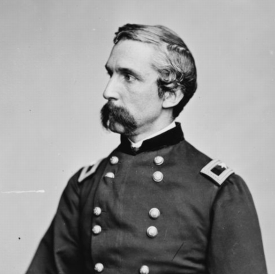Joshua Chamberlain, Educator, General, Governor
February 24 [1914] 
[Chamberlain in defense of his salute to the Confederates who surrendered at Appomattox
Joshua Lawrence Chamberlain Christian, Professor, General, and Governor of his home state of Maine.
Chamberlain came from a line of warriors. Great grandfathers served in the Revolution. a grandfather in the War of 1812, and his own father in Aroostook Indian War. One brother served with him in the 20th Maine and another as a chaplain of a Maine Regiment.
Chamberlain was raised as a Puritan and Huguenot. He attended a Military Academy as his father, a Lt. Col. of the Militia, wished for him to enter West Point. His mother desired he enter the ministry, which he chose to pursue for missionary work. Chamberlain taught himself Greek as a youth in order to enter Bowdoin College (he would eventually master nine languages). After graduating from Bowdoin, he attended Seminary for three years and graduated with a Master's Degree. He returned to Bowdoin as Professor of Rhetoric on the faculty until he entered the service of Maine as the Executive Officer of the 20th Maine Infantry Regiment.
While at Bowdoin, he befriended Harriet Beecher Stowe, who wrote the little book, "Uncle Tom's Cabin". Stowe's whose brother, Henry Ward Beecher, was leading theologian and abolitionist of the era. Stowe's book and Beecher's theology transformed society's understanding of the institution of slavery in America, and certainly convinced Chamberlain that slavery should come to an end.
Chamberlain's first major battle was at Frederkisburg, where he was pinned down all night by the withering fire from the stone-wall at Marye's Heights. It was at Gettysburg, however, that Chamberlain distinguished himself as the commander of the 20th Maine, which held Little Round Top on the flank until nearly out of ammunition, and the conducted a bayonet assault that overwhelmed the attacking Confederates. He distinguished himself again at the Siege of Petersburg, where he fell. General Grant promoted him to General. Chamberlain was a recipient of the Congressional Medal of Honor. He served in 20 battles. He was wounded six times and had six horses shot from under him. He was cited for bravery four times.
In the last days of the War, a Confederate General Gordon approached him with a flag of truce. General Lee wished a cease-fire to discuss terms of surrender. Chamberlain was chosen by Grant to command the guard at the surrender. As General Gordon's men passed by, Chamberlain called the Federals to Carry Arms, a salute to the Confederates, and Gordon returned the same, Honor for Honor. Chamberlain defended this tribute in his Appomattox chapter of The Passing of the Armies
After the war, Chamberlain was elected for four one-year terms as Governor. He then returned to teaching and served as President of Bowdoin until his old wounds forced him to retire. In 1898, at age 70, he volunteered for the Spanish American War but was turned down. He war wounds continued to pluage him until his death in 1914.
OrderofCenturions.org
--
Released by Primus Pilus
Legio Christi-Ecclesia Militans
"Let us therefore follow after the things which make for peace, and things wherewith one may edify another" [St. Paul's Epistle to the Romans 14:19]
* ORDO CENTURIONUM * IN HOC SIGNO VINCES * TIME DEUM ET OPERARE IUSTITIAM
No comments:
Post a Comment